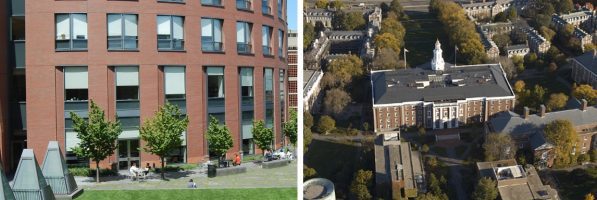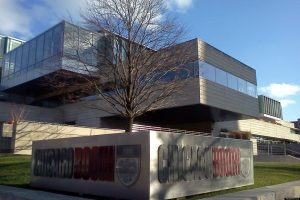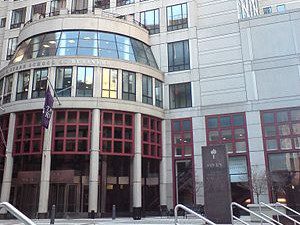7 Takeaways from the 2018 U.S. News Business School Ranking

The schools making up the top 10 in this year’s U.S. News & World Report ranking of the nation’s best MBA programs—released today—were exactly the same as last year. That said, there are a smattering of surprises in terms of how top schools rose and fell relative to one another—and in movement among schools outside of the top 15.
At quick glance, here are this year’s top 10, in order of their 2018 rank (2017 rank in parentheses):
1 Harvard Business School (1)
1 University of Pennsylvania’s Wharton School (4)
3 University of Chicago Booth School of Business (2, tie)
4 Stanford Graduate School of Business (2, tie)
4 MIT Sloan School of Management (5, tie)
4 Northwestern’s Kellogg School of Management (4, tie)
7 UC Berkeley Haas School of Business (7)
8 Dartmouth’s Tuck School of Business (8, tie)
9 Yale School of Management (8, tie)
9 Columbia Business School (10)
With today’s release, students, alumni and administrators at Harvard Business School (HBS) can toast their school’s third consecutive showing at the top of the list. But the University of Pennsylvania’s Wharton School has even more cause for celebration, having tied HBS for first this year. It’s only the second time in 28 years it has claimed the No. 1 spot. It’s also an important rebound for the Philadelphia school, which fell to fourth last year as it was surpassed for the first time ever by the University of Chicago Booth School of Business.
Chicago Booth isn’t letting up, though. It took third place this year after tying Stanford for No. 2 last year. After never having cracked the top three before, Booth’s now done it two years in a row.
Perhaps the biggest news among the top 10—and the farthest fall from grace—was Stanford Graduate School of Business (GSB)’s slide into a three-way tie for fourth place with MIT Sloan School of Management and Northwestern’s Kellogg School of Business. Stanford has never before not clocked in at least third or above in the U.S. News ranking.
Rounding out the top 10 were Haas, Tuck, Yale and Columbia—very similar to last year except that Yale slipped slightly, from a tie at eighth with Tuck to a tie this year at ninth with Columbia. It’s a slight gain for CBS, meanwhile, which last year was 10th, behind Tuck and Yale in a tie for eighth.
7 Key Takeaways from the 2018 U.S. News MBA Ranking
We’ve sifted through the data and compiled a summary of things worth taking notice of this year:
1) Wharton Is the Year’s Big Winner
Wharton has traditionally been considered part of the “holy trinity” of schools, behind only HBS and Stanford in many people’s eyes. That made last year’s fourth-place finish behind Chicago Booth a real blow.
This year, the school fought back—seizing a shared claim to first place for only its second time ever. Strong employment and pay figures—85.6 percent of graduates employed at graduation and the highest reported average salary of all schools, $155,058—helped significantly.
“This is excellent news for Wharton—especially after last year’s showing in the U.S. News ranking and, more broadly speaking, in light of the constant (and not always positive) media attention the school has garnered due to controversial alum, President Trump,” says Graham Richmond, Clear Admit’s co-founder. “While many will quip about employment figures and how they favor the likes of HBS and Wharton vs. Stanford, the key—from Wharton’s perspective—is being squarely back in the ‘trinity,’” adds Richmond.

Booth School of Business
2) Booth Stakes Its Claim in the Top Three
Last year, Chicago Booth tied Stanford for second place—its first time ever outranking Wharton and also the first time the Chicago school had secured a top-three spot in the history of the U.S. News rankings.
Making it into the top three for a second year in a row helps dispel any notions of last year being a fluke. A climbing GMAT average (726) and high employment numbers (84.9 percent employed at graduation) have played a part in its rise.
3) Methodology Disadvantages Stanford
Because U.S. News’ methodology relies on “grades” from corporate recruiters and other employment stats that favor larger firms over startups or entrepreneurial pursuits, schools with large numbers of students going into tech startups or entrepreneurship—such as Stanford—are essentially penalized. Stanford may be further hurt—at least in terms of the U.S. News list—by the fact that its graduates are confident enough that they’ll land a plum job that they can be a little choosier about which offers they accept. Indeed, only 62.8 percent of its MBAs were employed by graduation—as compared to 85.8 percent at Wharton, 84.9 percent at Chicago Booth and 79.3 percent at HBS.
Of course, Stanford came out ahead in terms of average GMAT/GRE scores (737), average undergraduate GPA (3.73) and overall student selectivity. With an acceptance rate of just 6 percent, it was by far the most selective school of all those ranked, with HBS accepting 10.6 percent, Wharton, 19.6 percent, and Chicago Booth, 23.6 percent. But these factors are given less weight than peer assessments and corporate recruiter survey scores as U.S. News crunches its data.
4) Yale SOM Defends Its Position in the Top 10
This year marks the third time since 2013 that Yale School of Management (SOM) has ranked in the top 10, giving the school an increasingly legitimate claim to membership in this elite club. In this most recent ranking, the New Haven school tied for No. 9 with CBS. Last year it tied at eighth with Tuck—a five-spot jump over the previous year.
Yale has been making improvements on several fronts. In 2011, the school hired Dean Edward Snyder—the very same dean who sat at the helm of Chicago Booth during its meteoric rankings rise in the early 2000s. Yale has also been poaching high-profile faculty from other schools over the last decade, including Andrew Metrick, professor of finance, and Anjani Jain, current assistant dean, both formerly Wharton faculty.
Add to that the opening of glittery new facilities in 2014 and the school’s traditional strength and reputation as a leader in the non-profit and corporate responsibility areas—currently in vogue with millennials—and the school’s continued top-10 showing makes sense.
5) Columbia Regains a Spot, Sort of
CBS is battling to maintain its top-10 claim, and its tie this year with Yale for ninth is theoretically an improvement over its 10th place finish last year. But it’s still down from the No. 8 spot it successfully defended from 2012 through 2016. Contributing factors could include the rising cost of living in New York and declining interest among applicants in the financial sector—but that’s just conjecture.
As we noted last year, CBS is one of only a few schools in the top 10 that haven’t recently unveiled a new building or substantially expanded their facilities, which could be a liability. Construction is underway for an impressive new Manhattanville campus, but its projected completion date has been pushed off from the original 2018.
Yale’s moving into—and remaining in—the top 10 has also exerted downward pressure on CBS.
6) NYU Stern Gets Its Scores in on Time, Bounces Back from 20 to 12
Last year’s biggest shock was NYU Stern’s plummet from No. 11 to No. 20. But as U.S. News noted at the time, the reason for Stern’s sharp decline was the fact that it didn’t get its GMAT/GRE scores in on time. When it did get the scores in, U.S. News refused to recalculate the rankings.

NYU Stern
The drop of nine spots on the list did seem harsh—and pretty implausible. Indeed, this year’s No. 12 showing seems much more legit for the traditionally top-15 school—suggesting it got its scores in on time this year.
Again, Clear Admit’s Graham Richmond weighs in: “Last year’s NYU Stern/U.S. News rankings fiasco did not paint U.S. News in the best of lights. It felt like a petty slap on the wrist aimed at Stern and served to raise questions about the validity of the rankings, which were arguably no longer accurate where a key school was concerned. While it is nice to see things seemingly back to ‘normal’ this year, the issue highlighted the perils of a straight ordinal ranking that some suspect can be tweaked to sell magazines, rather than a tiered ranking that represents the true matriculation behavior we see among applicants seeking an MBA.”
7) Movers and Shakers Elsewhere in the Ranking
Of course, there are many business schools beyond the top 10. U.S. News ranked 131 schools in total. Further down in the rankings you see some more precipitous gains and losses. On the plus side, Arizona State University’s W. P. Carey School of Business and USC’s Marshall School of Business both cracked the top 25. Carey jumped 10 places to 25th, from 35th last year. Marshall moved up seven spots to come in just ahead of Carey at 24th.
The University of Virginia’s Darden School of Business slipped three spots to 14th, it’s second consecutive year of decline. Vanderbilt’s Owen School of Management also took a hit, dropping from 22nd to tie with Carey at 25th. Falling out of the top 25 altogether was Rice University’s Jones Graduate School of Business, which dropped to No. 29. This, despite its 11-spot leap to eighth place in Bloomberg BusinessWeek’s November 2016 ranking.
This article has been edited and republished with permissions from Clear Admit.
Chicago Booth Names Stanford GSB Professor as Its Next Dean

The path from the Stanford Graduate School of Business (GSB) to the University of Chicago Booth School of Business is becoming well worn, as Chicago Booth prepares to welcome its second consecutive dean from the Palo Alto campus. Madhav Rajan, who chairs the accounting department at Stanford GSB and served as Senior Associate Dean for academic affairs from 2010 to 2016, will take the helm at Booth on July 1, the school announced yesterday.
Sunil Kumar, who served as Chicago Booth’s dean from 2011 until leaving to become provost of Johns Hopkins University in July 2016, also came from Stanford, where spent 14 years, ultimately in the role of Senior Associate Dean. Since his departure, Douglas Skinner, also an accounting professor, has served as Interim Dean as Chicago Booth conducted a global search for a successor.
“We sought the most outstanding candidate whose values, ambition and abilities fully comport with the distinctiveness of Chicago Booth as one of methodological rigor in its research and education, and through that commitment one of high impact on the world,” President Robert J. Zimmer and Provost Daniel Diermeier said in a statement announcing Rajan’s appointment yesterday.
As Senior Associate Dean for academic affairs at Stanford GSB, Rajan led the school’s MBA program, including overseeing admissions, curriculum, the student experience and career management. While at the GSB, Rajan also launched new joint-degree programs with Stanford’s engineering school and led initiatives toward greater integration of the business school within the larger university.
He also served as boss to Derrick Bolton, Stanford’s long-serving Admissions Director. In an interview with Clear Admit in August 2016, Rajan shared that he had, in fact, pushed Bolton to pursue other opportunities, perhaps contributing to Bolton’s decision to leave the GSB this past September to head the recently launched Knight-Hennessey Scholars Program.
“I had been encouraging him to think about other things he could do because it is a difficult job and he has been doing it for 15 years,” Rajan told Clear Admit. “The way he does it, the intensity he brings to it, the effort level—I was amazed that he did it for as long as he did it.”
A Compassionate, Supportive Leader
Rajan’s comments to Clear Admit suggest that he is a compassionate, supportive leader who offers those who work for him the autonomy to chart their own course. Of Bolton he said, “There is literally nobody at the GSB who works harder than Derrick. The amount of time, love and dedication that he puts into admissions is amazing and beyond what anyone could be expected to do. That level of commitment I have never seen from anybody, frankly.”
Asked if Bolton’s replacement (who has yet to be named) might change the school’s enduring essay prompt, Rajan offered further insight into how he leads. “That will be completely up to the new admissions director,” he said. “We have very much a notion of empowering people in their roles here, and the person hired to manage admissions will have complete latitude to run things the way he or she sees fit.”
A Beloved Teacher and Respected Scholar
Rajan has also won accolades for his teaching. In 2000, the University of Pennsylvania’s Wharton School bestowed upon him the David W. Hauck Award, its undergraduate teaching award. He taught at Wharton before Stanford, from 1990 to 2000. Next month, he is also slated to receive the Robert T. Davis Award for lifetime service and achievement, the GSB’s highest faculty recognition.
Rajan holds a bachelor’s degree from the University of Madras in his native India, as well as two master’s degrees and a Ph.D. from Carnegie Mellon University. His research has focused primarily on analyzing management accounting issues through an economics lens, especially as they relate to the choice of internal control and performance systems in firms. Cost Accounting: A Managerial Emphasis, which he co-authored, is the leading cost accounting textbook used around the world. He also served as editor of the Accounting Review from 2002 to 2008.
Returning to a School on the Rise
Rajan is not a stranger to Chicago Booth, having served as a visiting professor in 2007-08. In a release announcing his appointment, he expressed his respect for the school and his excitement to return. “The values I have in research and education are deeply valued at Chicago Booth,” he said. “People come here to do rigorous, empirically based research and analysis, which provides the basis for a transformative student experience and an extremely effective MBA curriculum. We have an exciting opportunity to take Booth’s deep strengths and leverage them here and around the world. I am thrilled to have the chance to be dean at what is unquestionably the greatest academic business school.”
Chicago Booth has been something of a rising star among leading MBA programs over the past decade, threatening Wharton’s previously undisputed place alongside Stanford and Harvard Business School (HBS) as the best business schools in the world. The Economist has ranked Chicago Booth the number one business school for five years running, from 2012 to 2016. And in last year’s U.S. News & World Report ranking, Booth tied with Stanford for second, behind HBS and ahead of Wharton.
Chicago Booth’s upward trajectory began under Edward Snyder, who preceded Kumar as dean from 2001 to 2010. In that time, the school almost doubled its number of endowed professorships, more than tripled its scholarship assistance to students, moved to a new Hyde Park campus, expanded its presence in Singapore, established a new campus in London, successfully completed a capital campaign and more than doubled its endowment. Snyder also successfully courted an unprecedented $300 million naming gift from alumnus David Booth before leaving to lead the Yale School of Management. Kumar continued that momentum, helping raise more than $300 million, focusing on student recruitment—including increasing the female enrollment of full-time programs from 35 percent to 42 percent—and expanding courses for undergraduates. Now it’s Rajan’s turn to take the baton. It will be interesting to see what his leadership holds in store.
This article has been edited and republished with permissions from Clear Admit.
The Top 5 Philly Marketing MBAs

Marketing is a competitive career field, and not all MBA programs are designed to train you to be a marketer. The key is finding a program that not only builds your skills in strategy, business, consumer behavior, decision-making theory and more but also has the right contacts within the marketing industry to help you get a job at a top company after graduation.
If you live in or are heading to Philadelphia, Pennsylvania, choosing the right MBA program for a career in marketing could be a difficult choice. There are a dozen programs to choose from, and each offers a unique perspective and special features that make them attractive. So, how do you decide which school to attend for an MBA in marketing?
A Wharton Professors Asks The Difficult Question: How Do We Save Good Jobs?

Automation, currently, is something close to an unanswerable quandary. Whether it’s not being properly addressed by businesses and government officials, or if the current solutions just aren’t viable, a host of distinguished experts has been leaving a trail of warnings—it’s coming, and we aren’t how to save good jobs.
Continue reading…
Wharton MBAs Will Get You Out Of The Social Media Bubble

The social media bubble has many definitions but perhaps could more accurately referred to as an echo chamber. As in, we are only listening and reading to precisely what we want to hear. That could sound innocent to those who preface cat videos and YouTube mixtapes, but often in the political sense it leads to unabashed biases going unchecked. Continue reading…
